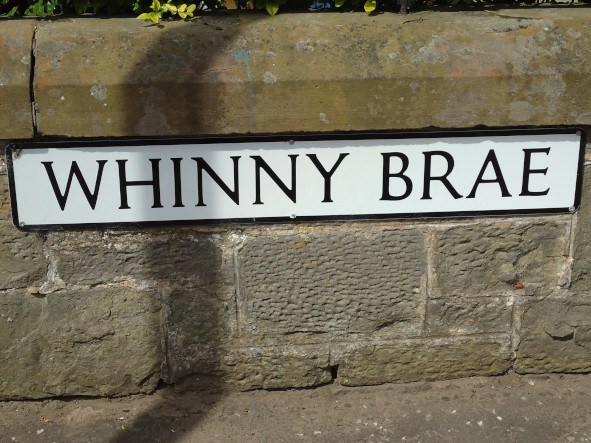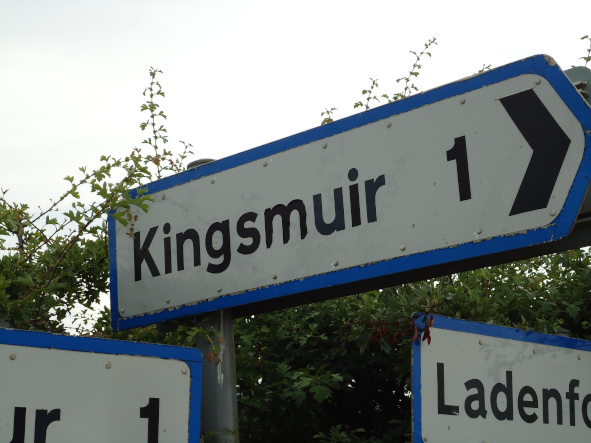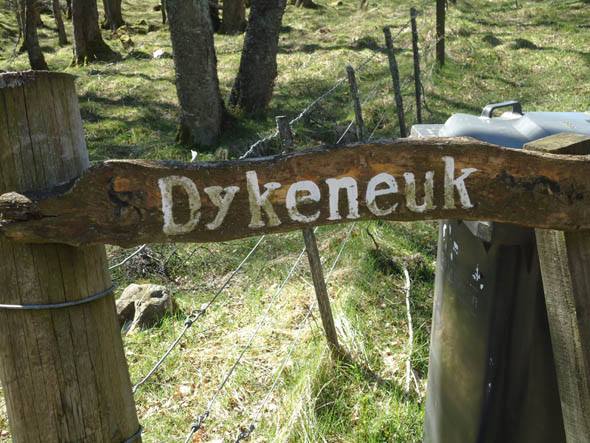Wir Ain Leed — South Northern Scots
Consonants
Consonants usually have the same phonetic values (pronunciation) in Scots, as in Standard English. For more detail see Orthography.
Medial and final <ch> us usually /x/ in words such as nicht, bocht and loch.
Initial <ch> is usually /ʧ/ in words such as chield, chowk, chap and chirl.
The cluster <nch> is usually /nʃ/ in words such as brainch, clinch, dunch, hainch, Inch and French.
The trigraph <tch> is usually /ʧ/ in words such as fleetch and wratch
The trigraph <dge> is usually /ʤ/ in fadge, begrudge, cadge and cruldge.
The graphemes <g> and <ge> are occasionally /ʤ/ in words such as gigot, breinge.
The cluster <gn> is usually /gn/ in words such as gnap and gnaw.
The cluster <kn> is usually /tn/ in words such as knap, knee, knot and knowe.
The cluster <ld> is usually /ld/ in words such as auld, bield, cauld, elder and fauld.
The cluster <nd> usually simplified to /n/ in words such as baund, daunder, haund, find and sindry.
The digraph <ng> is usually /ŋ/ in words such as finger, hing, ingan and single.
The digraph <nk> is usually /ŋk/ in words such as bink and hank.
The digraph <qu> is usually /kw/ in words such as acquent, queen and quair.
The digraph <sh> is usually /ʃ/ in words such as creash and sheep. Occasionally that is /ʒ/ in words such as fushion and pushion.
The digraph <th> is usually /θ/ in words such as graith, thole and thrawn and /ð/ in words such as blether, thaim and thair.
The digraph <wh> is usually /f/ in interrogatives such as wha, whan, whaur and whit and /ʍ/ all other words, for example, whaup, wheel, wheech and whin.
Vowels and Diphthongs
Vowels in unstressed positions are usually /ə/ in words such as aboot, the, oxter, duntit, bannock and smeddum.
Initial <a> is /ə/ in words such as ahint and awa etc.
The grapheme <a> is usually /a/, from Dundee to Arbroath, before /b/ and /g/, it may be /ɛ/, in words such as aff, lang, mak, wash and watch.
Final <a> is /aː/ but /ɔː/ is spreading in Angus, in words such as awa, twa and wha.
 Eassie, Angus
Eassie, AngusInitial and medial <au> is usually /aː/, /ɔː/ is spreading in Angus, in words such as auld, haud, haund, saul, saund and slauchter.
Final <aw> is usually /aː/, /ɔː/ is spreading in Angus, in words such as aw, blaw, caw, draw, faw, gnaw, gaw, haw, slaw, snaw and staw. That occasionally occurs word initial or medial in, for example, awn, awfu, bawbee and bawsant.
Initial and medial <ai> is usually /e/ in words such as aiblins, aik, aiple, ait, aith, braid,craitur, fain, gaither, graith and haimer.
Ther cluster <a-e> is usually /e/ in words such as ale, face, gate, hame and Pace. However, the cluster <ane> is usually /in/ in words such as alane, ane, ance, bane, gane, mane, nane and stane.
Final <ae> is usually /e/ in words such as ae, brae, f(r)ae, gae, sae, tae n. and wae. The <ae> is /ø/ inland but /y/ in West Angus, /i/ in Kincardinshire and /e/ along the coast, in words such as adae, dae, shae and tae v. However, those have often been replaced by the characteristic Central Scots pronunciations.
Final <ay> is usually /e/ in words such as day, gray and lay.
The digraph <ea> is usually /i/, in some words, in the North, it may be /e/, to the south that tendency is much stronger, in words such as beast, cheap, deave, east, heap, hear, meat, ream, sea and tea.
The digraph <ee> is usually /i/ in words such as dee, dree, eetem, freet, jeelie, keep, meet, teeth, weel and weet.
 St Vigeans, Angus
St Vigeans, AngusThe digraph <ei> is usually /i/ in words such as beir, deid, heid, meidae, peir, spreid, teir and threid. Also before /x/ in words such as dreich, heich, skeich.
The digraph <ie> is usually /i/ in words such as bield, chield, scrieve and shielin.
The grapheme <e> is usually /ɛ/ in words such as bed, ebb, esh, fecht, gled, gless, seck and wecht.
 Carnoustie, Angus
Carnoustie, AngusThe grapheme <i> is usually /ɛ/ in words such as drink, in, inch, licht, lift, pit, rin, simmer, sin and stibble. However, after <w> and <wh> that is often /ʌ/ in words such as whin, whisper, whit, wid, wind, wir, wird, wirm and wittins.
The graphemes <o> and <oa> are usually /o/ in words such as boat, boss, box, coal, cod, common, dochter, on, rock and thocht.
 Duntrune, Dundee
Duntrune, DundeeThe digraph <oo> is usually /u/ in words such as aboot, coont, droop, hoose, moose, oot, scoor and soond.
The digraph <ou> is usually /u/ in words such as allou, bouk, broun, cour, coum, doun, dout, poupit and thoum.
The cluster <u-e> is usually /u/ in words such as dule and hure.
The grapheme <u> is usually /ʌ/ in words such as bund, burn, drunken, fund, grund, truff, unce and wund.
 Forfar, Angus
Forfar, AngusThe digraph <ui> is is /ø/ inland but /y/ in West Angus, /i/ in Kincardinshire and /e/ along the coast, in words such as abuin, abuise, bluid, bruit, buird, cuil, cuit, duin, fluir, fruit, fuird, guid, luif, luim, muin, muir, muisic, ruise, schuil, shuir, spuin, uise, uiss and Yuil. However, those have often been replaced by the characteristic Central Scots pronunciations.
The digraph <eu> is usually /ju/ in beuch, beuk, eneuch, heuk, leuch, leuk, neuk, sheuch, teuch and teug.
The digraph <ew> is usually /ju/ in words such as dew, few, new and spew.
 Glenesk, Angus
Glenesk, AngusThe clusters <i-e> and < y-e> are usually /əi/ in short environments and /aɪ/ or /ae/ in long environments, in words such as advice, bide, bile, fine, fire, ile, rive, tyne, wise adj. and wyte.
The graphemes <ey> and <ye> are usually /əi/ in short environments and /aɪ/ or /ae/ in long environments, in words such as cry, eyntment, eyster, fley and kye.
The digraphs <oi> and <oy> are usually /oi/ in words such as Boid, foy, noise and ploy.
 Ethie, Angus
Ethie, AngusInitial and medial <ow> is usually /ʌu/ in words such as bowt, cowp, cowt, gowd, gowf, lowp and owsen. Root final that is <owe> in words such as flowe, glowe, growe, howe, knowe, lowe, rowe and towe.
Suffixes
Strictly speaking not a suffix, <ae> is usually /ə/ in words such as Americae, airae, barrae, nairae, swallae and windae.
Diminutive <ie> is usually /i/ if the preceding vowel is /i/ or /əi/, or the preceding consonant is /b, d, ð, g, v, ʒ/ or /z/, otherwise /ɪ/ or alternatively /e/, in words such as grannie, laddie, lassie, shappie and wifie.
Adjectival <fu> is usually /fɛ/ in words such as awfu, carefu and mensefu.
The negative particle <na> is usually /nə/ in words such as daena (dinna), haesna, maunna, winna and wisna.
Adverbial and adjectival <y> and <ie> are usually /i/ if the preceding vowel is /i/ or /əi/, or the preceding consonant is /b, d, ð, g, v, ʒ/ or /z/, otherwise /ɪ/ or alternatively /e/, in words such as reekie, sairy, stany and stourie.
Adverbial <ly> is usually /li/ if the preceding vowel is /i/ or /əi/, or the preceding consonant is /b, d, ð, g, v, ʒ/ or /z/, otherwise /lɪ/ or alternatively /le/, in words such as brawly, feckly, fully, geyly, likely and uncoly.
Literature:
Adams, David (1996) "The Angus and Mearns Dialect" in Bothy Nichts And Bothy Days, Edinburgh: John Donald, 77-87.
Gray, Walter (1992) Parliamo Aberbrothock, Arbroath: Herald Press.
Mather, James Y. and H. H. Speitel (1986) The Linguistic Atlas of Scotland volume 3, London: Croom Helm.
Johnston, Paul (1997) "Regional variation" in Charles Jones ed. The Edinburgh History of the Scots Language, Edinburgh University Press, 443-513.
